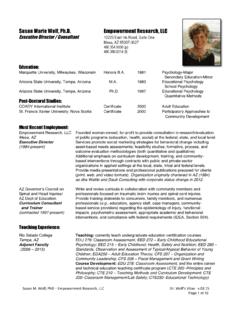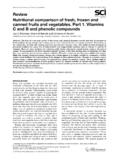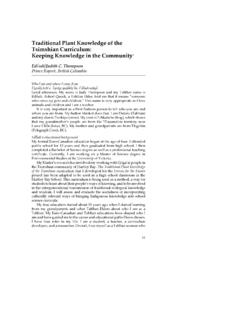Transcription of Pathways to Quality Inpatient Management of …
1 Pathways to Quality InpatientManagement of hyperglycemia andDiabetes: A Call to ActionBORISDRAZNIN,MD, PHD1 JANICEGILDEN,MS, MD2 SHERITAH. GOLDEN,MD, MHS3 SILVIOE. INZUCCHI,MD4 FOR THEPRIDEINVESTIGATORS*Currently patients with diabetes comprise up to 25 30% of the census of adult wards and criticalcare units in our hospitals. Although evidence suggests that avoidance of hyperglycemia (.180mg/dL) and hypoglycemia (,70 mg/dL) is beneficial for positive outcomes in the hospitalizedpatient, much of this evidence remains controversial and at times somewhat contradictory. Wehave recently formed a consortium for Planning Research in Inpatient Diabetes (PRIDE) with thegoal of promoting clinical research in the area of Management of hyperglycemia and diabetes in thehospital.
2 In this article, we outline eight aspects of Inpatient glucose Management in which ran-domized clinical trials are needed. We refer to four as system-based issues and four as patient-basedissues. We urge further progress in the science of Inpatient diabetes Management . We hope this callto action is supported by the American Diabetes Association, The Endocrine Society, the AmericanAssociation of Clinical Endocrinologists, the American Heart Association, the European Associationfor the Study of Diabetes, the International Diabetes Federation, and the Society of Hospital Med-icine. Appropriate federal research funding in this area will help ensure high- Quality investigations,the results of which will advance thefield.
3 Future clinical trials will allow practitioners to developoptimal approaches for the Management of hyperglycemia in the hospitalized patient and lessenthe economic and human burden of poor glycemic control and its associated complications andcomorbidities in the Inpatient Care36:1807 1814, 2013 Over the past decade, there has beenincreasing interest in glycemic man-agement of hospitalized is now broad consensus that bothhyperglycemia and hypoglycemia in hospi-talized patients are associated with adverseoutcomes, including mortality. There is lessagreement, however, as to whether theseassociations actually reflect the effects of thequality of glucose Management or aremerely underlying paraphenomena of theseverity of acute illness.
4 Even more contro-versial is the actual potential impact ofglycemic control during these hospitaliza-tions that are often relatively brief, thespecific glucose ranges that should be tar-geted, and the methods by which cliniciansmight achieve the 1960s, research on the benefits ofglucose-insulin-potassium infusion duringacute myocardial infarction began, but thisline of inquiry was not focused on glucosecontrol per se (1). Interest in the generalfield of glycemic Management in the inpa-tient setting began in the mid 1990s (2). Thenext 10 years were marked by both prospec-tive observational trials and randomizedclinical trials (RCTs), the majority of whichseemed to indicate that lower is better :hospital complications, length of stay, cost,and even mortality could be dramaticallydecreased in a variety of critical care settingsif mean glucose concentrations were re-duced, usually with intravenous insulin, to-ward or within the euglycemic range (3,4).
5 Some results, however, seemed too good tobe true, especially in the context of suchshort hospital stays. This skepticism led toconfirmatory trials, most conducted using amulticenter design. These could not con-firm the initial positivefindings fromsingle-center investigations (5 7). Therewas resulting confusion as to how these re-sults might shape clinical practice. Severalconsensus documents have emerged, eachendorsing a more moderate approach to themanagement of glycemia in the hospitalizedpatient (8 11). Notably, all have called formore research in this area so that we canbetter understand the impact of both hyper-glycemia and hypoglycemia on inpatientoutcomes and better delineate evidence-based standards for hospital date, most investigations have beenfunded through local resources or industry,as agencies appear reluctant to commitfinancial support for research in inpatientglycemic Management .
6 However, greaterefforts devoted to the study of diabetes inthe hospital setting would have broadimplications for our health care system(12). In addition to funding, the nascentdiscipline of Inpatient glucose manage-ment will benefit from standardized no-menclature, consistent and meaningfulmetrics, and transparent study designsand analytical methods allowing for com-parison of study this article, we outline eight aspectsof Inpatient glucose Management in whichRCTs and/or rigorously designed observa-tional studies are needed. We refer to fouras system-based issues and four as patient-based issues. Our goal was to identifyexisting research gaps and clinical carechallenges in Inpatient glucose manage-ment and to suggest future directions foreach.
7 These are summarized in Table issuesObstacles for glycemic control inthe hospitalDespite growing evidence supporting theimportance of glycemic control in thehospital setting (13 15), numerous obsta-cles stand in the way of its factors include unanticipatedchanges in nutrition; medication changesccccccccccccccccccccccccccccccccc ccccccccccccccccFrom the1 Division of Endocrinology, Diabetes and Metabolism, University of Colorado School of Medicine,Aurora, Colorado; the2 Division of Diabetes and Endocrinology, Department of Medicine, Chicago MedicalSchool, Rosalind Franklin University of Medicine and Science, North Chicago, Illinois; the3 Division ofEndocrinology and Metabolism, Johns Hopkins University School of Medicine, Baltimore, Maryland; andthe4 Section of Endocrinology, Yale University School of Medicine, New Haven, author: Boris Draznin, *A complete list of the members of the PRIDE Writing Group can be found in the APPENDIX.
8 2013 by the American Diabetes Association. Readers may use this article as long as the work is properlycited, the use is educational and not for profit, and the work is not altered. See for accompanying articles, pp. 2107 and ,VOLUME36, JULY20131807 PERSPECTIVES IN CARET able 1dKey issues in Inpatient glucose Management , suggested solutions, and areas in which future research is neededSuggested solutions and future research neededSystem-based issuesObstacles for glycemic controlin the hospitalDevelopment and evaluation of provider Inpatient glucose Management education barriers to achieving glycemic controlcImprove provider knowledge of critical glucose Management topics toenhance patient safetyDevelopment and evaluation of point-of-care electronic clinical decision aids toguide prescribers in implementing evidence-based Inpatient glucose Management sign-out tools to enhance provider insulin/glucose data displaycDaily diabetes
9 Rounding sheetImplementation and impact ofglycemic Management teamsUse QI statistical methodologies that allow systematic evaluation of the impact ofmulticomponent glucose Management programs on process, intermediary, andclinical outcome multicenter, prospective trials of different team-based glycemic controlstrategies within single healthcare of glucometricsand benchmarking amonghospitalsDetermine an agreed-upon definition of Inpatient hypoglycemia and hyperglycemiausing thresholds that are associated with adverse clinical and economic of professional organizations with The Joint Commission to assist withstandardization of glucometrics to which hospitals will be held impact of glycemiccontrol in the hospitalPerform RCTs and observational studies to examine different treatment approaches toachieving glycemic control in noncritically ill
10 Patients on hospital costs and length of retrospective and prospective studies to determine which elements of multicomponentglucose Management programs are most issuesSliding scale vs. nutritional/correctionalscheduled insulin administrationPerform comparative effectiveness RCTs, similar to RABBIT, comparing scheduled insulin(basal/nutritional/correctional) to sliding scale insulin (basal1sliding scale withoutnutritional insulin).Health services studies to evaluate the impact of systems interventions on prescribing control in specialpatient populationsPatients on enteral andparenteral nutritionComparative effectiveness RCTs comparing several approaches to insulin insulin vs.








